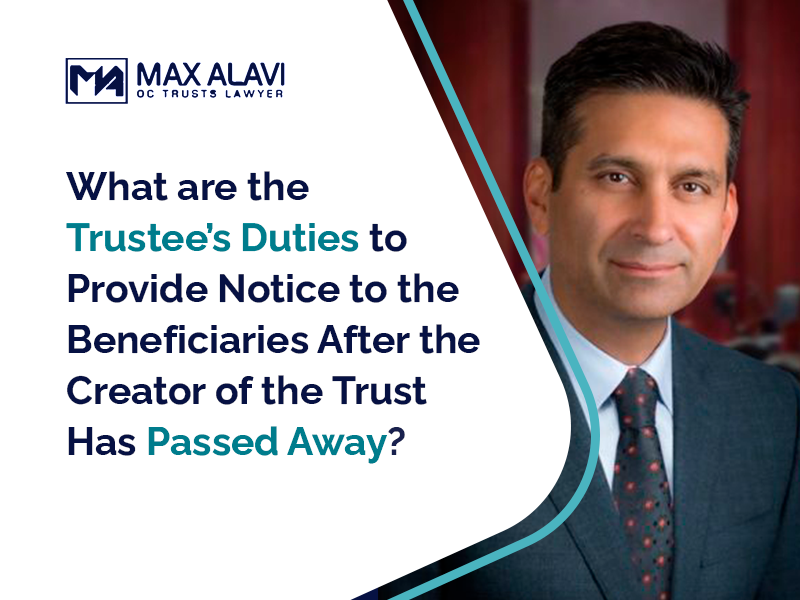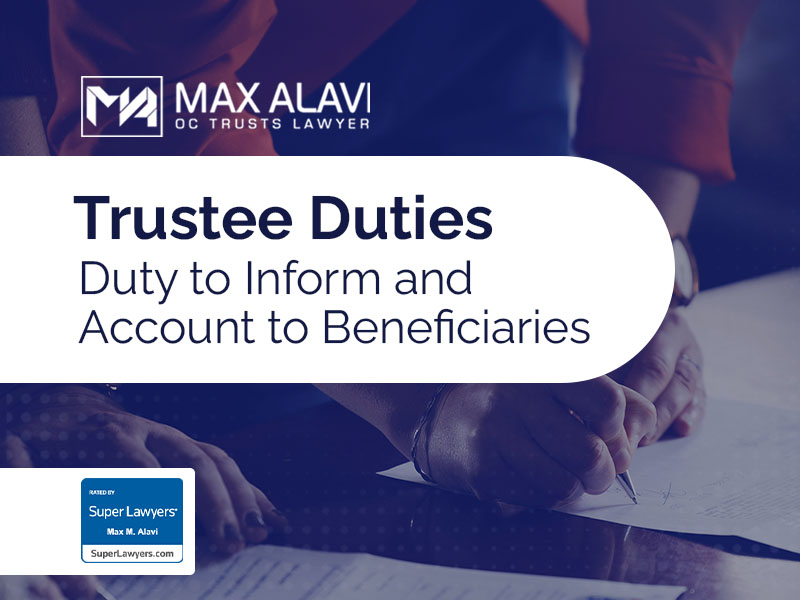When you serve as a trustee, one of your core responsibilities is notifying each heir and beneficiary as to the death of the trust’s creator. Additionally, you must notify each heir and beneficiary when the trust becomes irrevocable (which can happen if the trust’s creator becomes incapacitated).
But what exactly should this notification include? What timeframe does the trustee have for providing the notice? And should a copy of the trust be included? For answers to each of these questions, check out the most recent post from Max Alavi APC, OC Trusts Lawyer.
What are the Trustee’s Duties to Provide Notice to the Beneficiaries After the Creator of the Trust Has Passed Away?
When you serve as a trustee, one of your core responsibilities is to appoint someone to serve as your successor, taking over the administration of the trust after you pass away. Given the weighty responsibilities of managing a trust, this is not a duty to be taken lightly. Certainly, it is important to find someone who is well-organized, trustworthy, and competent. Ideally, it will be someone who lives nearby.
The successor trustee will have a number of duties to fulfill, and one of them will be providing notice of your death to all of the beneficiaries and heirs who are named in the trust. Each beneficiary and heir must receive notice that the trustee has passed within a window of 60 days. Additionally, the successor trustee must alert each beneficiary and heir if the trust becomes irrevocable (which can happen if the original creator of the trust becomes incapacitated).
The Trustee’s Duty to Provide Notice
When providing notice to the trust’s heirs and beneficiaries, what types of information must be shared? According to California Probate Code § 16061.7, notice must include the following information:
- The name of the person who created the trust, and the date on which the trust was signed.
- The address of the physical location where the trust will be administered.
- Any details that are specifically required by the terms of the trust.
- A notification that a true and complete copy of the trust is available upon reasonable request.
- A notice regarding the 120-day period in which the trust can be contested.
The notice does not have to include a copy of the trust itself. With that said, providing a copy of the trust is usually advisable, as it can minimize the risk of that 120-day contest period being extended.
Talk with a Living Trust Attorney Today
As you consider the duties of the trustee, and seek to execute them faithfully and prudently, it’s natural for some questions to arrive. That’s why it’s important to be in contact with a reputable living trust attorney, who can give counsel on how to serve as an effective trustee and how to uphold your legal obligations to each heir and beneficiary.
Max Alavi APC, OC Trusts Lawyer, has an exemplary track record in living trust and probate law, and is an invaluable ally to trustees across the Orange County area. An outstanding history of legal victories, along with a portfolio of rave reviews, attest to his skill and experience. If you have any questions about a living trust or about executing the duties of a trustee, reach out to Max Alavi APC, OC Trusts Lawyer today.






